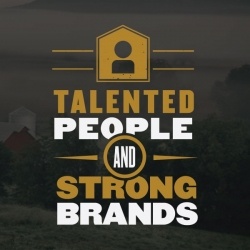 Article
Article
Vomberg, A., Homburg, C. and Bornemann, T. (2015), Talented people and strong brands: The contribution of human capital and brand equity to firm value. Strat. Mgmt. J., 36: 2122–2131. doi: 10.1002/smj.2328
Reviewer
Dr. Michael Gunderson, Director and Professor
Summary
The authors note that typically researchers have considered individually the impacts of brand equity and human capital. They suggest that these two are likely to have interdependent effects. The authors use a database of more than 200 firms to assess the interdependency. They conclude that brand equity positively affects firm value, while there is no statistical evidence that human capital affects firm value. There are, however, complementarities that come from having strong brand equity and human capital. Firms that are service oriented rather than product oriented have more pronounced interdependencies.
 What this means for food and agribusinesses
What this means for food and agribusinesses
Building brand equity is every employee’s job.
Agribusiness managers will have to balance investments in brand equity and human capital keeping in mind their interdependence. Old organizational structures that isolate marketing and production will impede the interdependent impacts of brand equity and human capital. Agribusinesses will need to integrate the role of two functions. In the spring, I suspect no employee is more important to an agricultural retailer’s brand equity than an applicator. That applicator essentially is the brand as long as he or she is in the customer’s field. Sometimes the applicator’s face-to-face interactions with the customer will be as important as physically driving over the field to apply inputs correctly.
Agribusinesses that provide inputs to agricultural producers are increasingly providing a sophisticated set of services. Of course, agricultural retailers have been offering application services, in addition to chemicals and fertilizers, for many decades. More recently, they have increasingly offered services focused on leveraging precision technology, soil testing and mapping, and data analysis. As agribusinesses continue to meet this industry demand, it will become more imperative that the employees understand their role in building brand equity. The new services demand an increasingly sophisticated and rare set of skills.
This interdependence is also likely to affect strongly the commodity merchandisers that initially purchase products from agricultural producers. The research here reinforces the idea that brand equity reduces perceived risk and provides symbolic benefits. These merchandisers are offering services to assist a producer with risk management. If the producer is interacting with the merchandiser with risk management top of mind, then it seems likely that brand equity is even more important relative to other settings.
As Vomberg, Homburg, and Boremann note, “Brands can make services more concrete, thus reducing the associated risk.” Services differ from product offerings because customers must experience services to assess the value. Strong brand equity gives the first-time customer of services greater confidence that the service will be of value. In order to establish strong brand equity, the firm needs to have highly skilled employees. The skilled employees deliver the services that most completely meet the demands of the customer.
Vomberg, Homburg, and Boremann continue the analysis of the interdependence of brand equity and human capital. The authors note that firms with strong brand equity are more likely to attract the employees with the strongest skill sets. Employees that join a firm based on its strong brand equity are also more likely to have goals that align with the firm’s goals. Hiring well-qualified people helps strengthen brand equity. Having strong brand equity helps with hiring well-qualified people.
In addition to hiring well, agribusiness managers can put processes into place that reinforce the interdependence. Managers can work with employees on so-called “soft skills.” Skills such as clear communication and teamwork are more important than ever in an organization with an increasing service focus. Managers can reward employees for professionalism in appearance, interactions, and conduct. Mangers can collect information from customers regarding how employees represent the brand. Building brand equity, after all, is every employee’s job.




